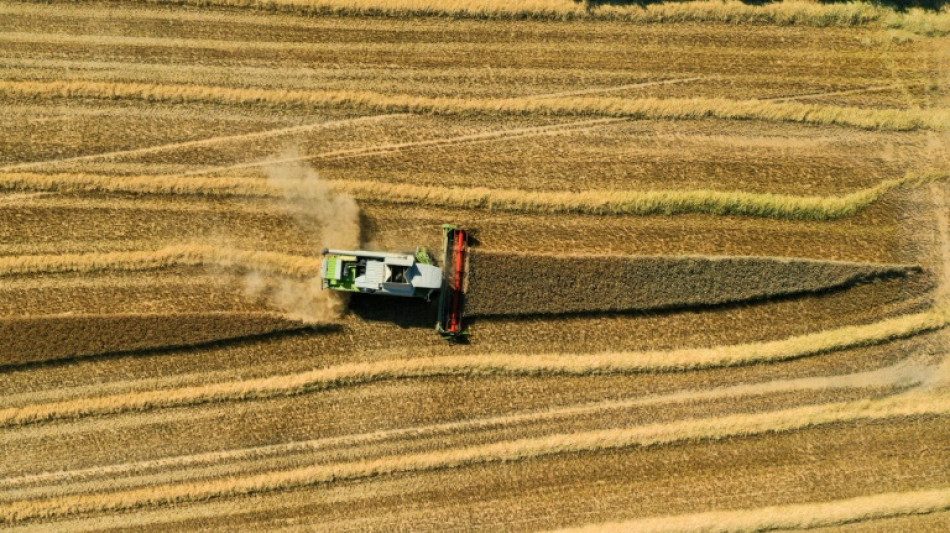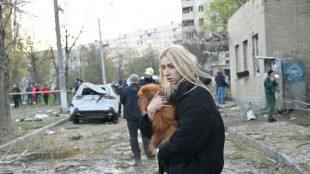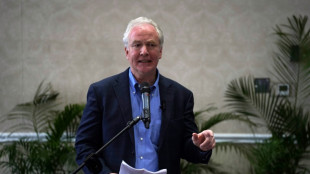
-
 SFWJ / Medcana Announces Strategic Expansion Into Australia With Acquisition of Cannabis Import and Distribution Licenses
SFWJ / Medcana Announces Strategic Expansion Into Australia With Acquisition of Cannabis Import and Distribution Licenses
-
Arsenal's Havertz could return for Champions League final

-
 US officials split on Ukraine truce prospects
US officials split on Ukraine truce prospects
-
Client brain-dead after Paris cryotherapy session goes wrong

-
 Flick demands answers from La Liga for 'joke' schedule
Flick demands answers from La Liga for 'joke' schedule
-
'Maddest game' sums up Man Utd career for Maguire

-
 Trial opens for students, journalists over Istanbul protests
Trial opens for students, journalists over Istanbul protests
-
Gaza rescuers say Israeli strikes kill 24 after Hamas rejects truce proposal

-
 'Really stuck': Ukraine's EU accession drive stumbles
'Really stuck': Ukraine's EU accession drive stumbles
-
'Not the time to discuss future', says Alonso amid Real Madrid links

-
 74 killed in deadliest US attack on Yemen, Huthis say
74 killed in deadliest US attack on Yemen, Huthis say
-
Southgate's ex-assistant Holland fired by Japan's Yokohama

-
 Vance meets Meloni in Rome before Easter at the Vatican
Vance meets Meloni in Rome before Easter at the Vatican
-
Ryan Gosling to star in new 'Star Wars' film

-
 Hamas calls for pressure to end Israel's aid block on Gaza
Hamas calls for pressure to end Israel's aid block on Gaza
-
Russia says Ukraine energy truce over, US mulls peace talks exit

-
 58 killed in deadliest US strike on Yemen, Huthis say
58 killed in deadliest US strike on Yemen, Huthis say
-
Museums rethink how the Holocaust should be shown

-
 Three dead after deadly spring storm wreaks havoc in the Alps
Three dead after deadly spring storm wreaks havoc in the Alps
-
No need for big changes at Liverpool, says Slot

-
 Bloody Philippine passion play sees final performance of veteran 'Jesus'
Bloody Philippine passion play sees final performance of veteran 'Jesus'
-
New US envoy prays, delivers Trump 'peace' message at Western Wall

-
 Postecoglou sticking around 'a little longer' as Spurs show fight in Frankfurt
Postecoglou sticking around 'a little longer' as Spurs show fight in Frankfurt
-
US threatens to withdraw from Ukraine talks if no progress

-
 Tears and defiance in Sumy as Russia batters Ukraine border city
Tears and defiance in Sumy as Russia batters Ukraine border city
-
Russia rains missiles on Ukraine as US mulls ending truce efforts

-
 Tokyo leads gains in most Asian markets on trade deal hopes
Tokyo leads gains in most Asian markets on trade deal hopes
-
Two missing after deadly spring snowstorm wreaks havoc in the Alps

-
 'War has taken everything': AFP reporter returns home to Khartoum
'War has taken everything': AFP reporter returns home to Khartoum
-
US strikes on Yemen fuel port kill 38, Huthis say

-
 Slegers targets Lyon scalp in pursuit of Arsenal European glory
Slegers targets Lyon scalp in pursuit of Arsenal European glory
-
'Defend ourselves': Refugee girls in Kenya find strength in taekwondo

-
 China's manufacturing backbone feels Trump trade war pinch
China's manufacturing backbone feels Trump trade war pinch
-
Sri Lankans throng to Kandy for rare display of Buddhist relic

-
 Chinese vent anger at Trump's trade war with memes, mockery
Chinese vent anger at Trump's trade war with memes, mockery
-
Heartbroken Brits abandon pets as living costs bite

-
 Mongolian LGBTQ youth fight for recognition through music, comedy
Mongolian LGBTQ youth fight for recognition through music, comedy
-
Cash crunch leaves Syrians queueing for hours to collect salaries

-
 Lyon left to regroup for Champions League bid after painful European exit
Lyon left to regroup for Champions League bid after painful European exit
-
Unravelling Real Madrid face Athletic Bilbao Liga test

-
 Napoli disturbing buoyant Inter's peace in Serie A Easter bonanza
Napoli disturbing buoyant Inter's peace in Serie A Easter bonanza
-
Disappointed Dortmund chase consistency with Europe at stake

-
 Asian markets mixed as traders track tariff talks
Asian markets mixed as traders track tariff talks
-
Yan and Buhai share lead at LA Championship

-
 Under fire at debate, Canada PM Carney tries to focus on Trump
Under fire at debate, Canada PM Carney tries to focus on Trump
-
Liverpool poised for Premier League coronation, Leicester, Ipswich for relegation

-
 India's elephant warning system tackles deadly conflict
India's elephant warning system tackles deadly conflict
-
US senator meets wrongfully deported Salvadoran migrant

-
 Gustavo Dudamel: the superstar conductor building bridges to pop
Gustavo Dudamel: the superstar conductor building bridges to pop
-
Japan rice prices soar as core inflation accelerates


Climate change made 2022 drought 'at least 20 times likelier'
Human-caused climate change made this summer's drought across the Northern Hemisphere at least 20 times more likely, according to a rapid analysis released Wednesday that warns such extreme dry periods will become increasingly common with global heating.
The three months from June-August were the hottest in Europe since records began, and the exceptionally high temperatures led to the worst drought the continent has witnessed since the Middle Ages.
Crops withered in European breadbaskets, as the historic dry spell drove record wildfire intensity and placed severe pressure on the continent's power grid.
Successive heatwaves between June and July, which saw temperatures top 40 degrees Celsius (104 degrees Fahrenheit) in Britain for the first time, saw some 24,000 excess deaths in Europe.
China and North America also experienced unusually high temperatures and exceptionally low rainfall over the period.
An international team of climate scientists have determined the warming caused by human activity made such extreme weather significantly more likely than it would have been at the dawn of the industrial age.
The World Weather Attribution service calculated that the agricultural and ecological drought over the Northern Hemisphere was at least 20 times likelier thanks to global heating.
"The 2022 summer has shown how human-induced climate change is increasing the risks of agricultural and ecological droughts in densely populated and cultivated regions of the North Hemisphere," said Sonia Seneviratne, a professor at the Institute for Atmospheric and Climate Science at ETH Zurich in Switzerland and one of the study contributors.
- 'Faster than expected' -
To quantify the effect of human-caused climate change on soil moisture levels, the team analysed weather data and computer simulations to compare the real climate as it is today -- that is, some 1.2C hotter than pre-industrial levels -- with a climate absent of any human-induced heating.
They found that western and central Europe experienced particularly severe drought and substantially reduced crop yields.
Moisture in the top 7cm of soil across the Northern Hemisphere was made five times likelier to experience severe drought due to climate change, the study found.
For the top one metre of soil -- known as the root zone -- this summer's dryness was made at least 20 times likelier due to global heating.
"Really what is most relevant for agriculture and ecological impacts is the top one metre of the soil because that's where plants have their roots," said Seneviratne.
Overall, a Northern Hemisphere drought such as this summer's was now likely to occur once every 20 years in today's climate, compared to once every 400 years in the mid eighteenth century.
Producers in Europe and China have warned of significantly lower than expected harvests in crop staples due to the dry spell, after food prices spiked to multi-year highs following Russia's invasion of Ukraine in February.
Friederike Otto, senior lecturer in climate science at the Imperial College London, called the crop shortfall "particularly worrying".
"It followed a climate change-fuelled heatwave in South Asia that also destroyed crops, and happened at a time when global food prices were already extremely high due to the war in Ukraine," she said.
Otto said the Northern Hemisphere in general was showing a "pure climate change signal" in its overall warming trends.
Maarten van Aalst, director of the Red Cross Red Crescent Climate Centre and professor of climate and disaster resilience at University of Twente, said governments needed to do far more to prepare for future heat and drought shocks, which will become ever more frequent as temperatures rise.
"We're talking tens of thousands of people killed by these phenomena and one thing that we're seeing is the impacts compounding and cascading across regions and sectors," he said.
"It's playing out in front of our eyes even faster than we might have expected."
A.Rodriguezv--AMWN



